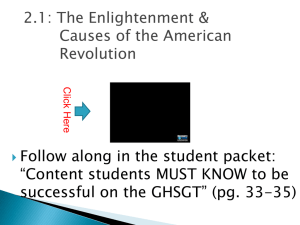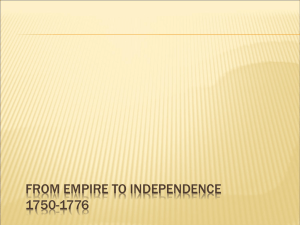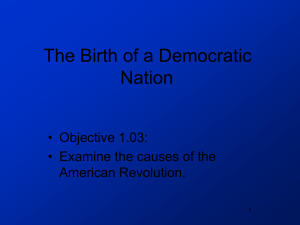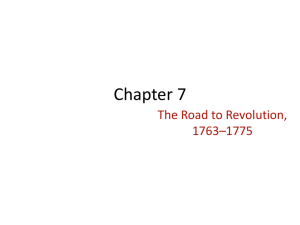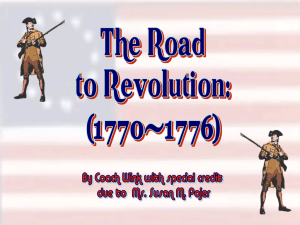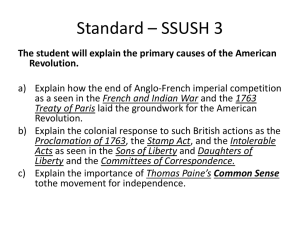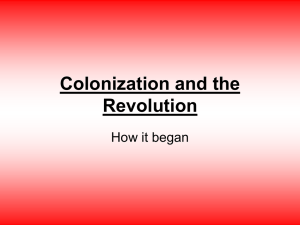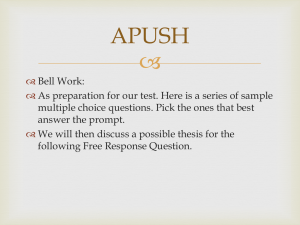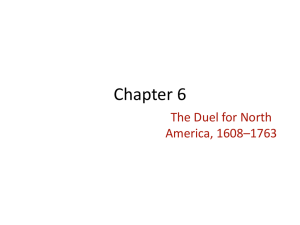File
advertisement
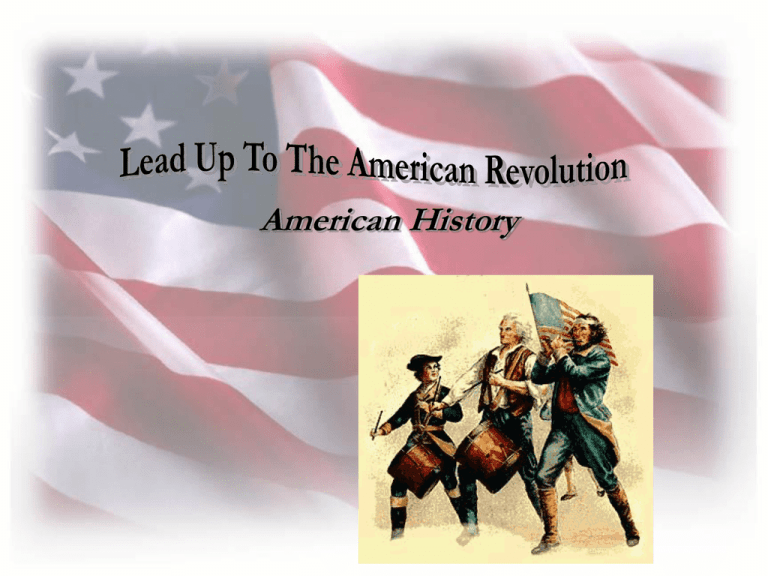
American History Review • Remember the European countries involved in colonizing America? • Summary: There was a lot of warfare and Britain won in the end. – Here’s how… • Known as the Seven Years War in the rest of the world. • English / French rivalry in North America erupted into war in 1754 • Lasted until 1763 • French defeat resulted in the Fall of New France • Britain became the world’s greatest colonial power & gained control of North America • June 1759, Royal Navy with 200 ships traveled up the St. Lawrence & carried a powerful British army to Quebec • Bombarded Quebec for 9 weeks • Attacked on Sept 13, 1759 with British General James Wolfe defeating Montcalm who led the French forces • Defeated the French on the Battle of the Plains of Abraham & captured Montreal in 1760 •At the Treaty of Paris (1763), British gained nearly all of France’s possessions in North America including Canada and territory immediately to the west of the Appalachian Mts. •The war determined that English rather than French ideas and institutions would dominate North America • War Debt/Need for new Taxes – French & Indian War – Seven Years’ War – Needed more money to maintain military & naval forces • Florida & Canada – Needed to be governed & reorganized according to British ways – How to make people living their become loyal British subjects? • First, the Proclamation of 1763 (Set a border at the frontier to increase control) • Britain believed that all colonies should help pay for colonial defense so new methods of raising revenue were introduced • This was done without consulting the colonists • The French and Indian War cost the British a lot of money (doubled national debt) so the British adopted a new policy towards the 13 Colonies • Decided to maintain a large army in N. America • Abandoned Salutary Neglect & attempted to make the American colonists pay for the defense of their territory that was under British rule. Timeline/Chart Activity Definitions • George III: King of England during the American Revolution • George Grenville: British Prime Minister • Thomas Gage:Commander in Chief of the British forces in North America • Sons of Liberty: Group of colonists who rioted and protested British rule. • Taxation without Representation:Colonists were opposed to the idea that laws were passed by a government that they could not vote for. • Writs of Assistance: Search warrants that allowed a British official to search anything. Britain decides to implement taxes in order to regain money lost in the war. Fill in your chart based on the following slides. • British Purpose – Prohibits European settlement west of the Appalachian Mountains. – Britain wanted to appease First Nations and not have them angry so as to cause another war. • American Response – Wanted more land because of over population in the colonies – Colonies were angry • a direct tax paid directly to the government • required that all printed material (newspapers, shipping documents, playing cards) must bear a stamp to show that a tax had been paid to Gr. Britain. • money collected was to be used to help pay the costs of defending & protecting the American frontier near the Appalachian Mountains • Protests, petitions, and boycotts of British goods • Riots, burned stamps in the streets, destroyed stamp collectors offices, tarred & feathered British supporters • Sons of Liberty : American patriots who attacked symbols of British authority & power before the American Revolution 1765 Stamp Act • British parliament repealed the Stamp Act but affirmed their right to make laws for the colonies • American Response: – Americans fought for “No Taxation without Representation” – Taxation without Representation: Colonists were opposed to the idea that laws were passed by a government that they could not vote for. • Levied import taxes on articles of everyday use in America • Tea, lead, glass, & colors for paint • Writs of Assistance were legalized to enforce it – Search warrants that allowed a British official to search anything. • American Response: – Boycotts and protests – British empire lost money due to boycotts • Later repealed in 1770 following colonial protests & the Boston Massacre • First clash between the American colonists & British troops. • Shots were fired when a crowd began throwing snowballs & rotten eggs at British soldiers • five people died • Rumor spread, & it became known as a massacre • British govt passed a law that gave the British East India Co the ability to sell tea in the colonies without paying tax • This damaged the businesses of local colonial merchants • American Response: – Boston colonists, disguised as Native Americans, dumped wooden chests of tea into Boston Harbour. Boston Tea Party • A series of Acts in response to • • • • Boston Tea Party: Port of Boston closed Mass. colonists not permitted to hold town meetings Soldiers were to be quartered (housed) in colonists’ homes American Response: – Other colonies replied with letters of support for Boston – Colonies start to support each other – Called them “Intolerable Acts” • Tried to gain the support of French-Canadians (enlarged the size of Quebec) • Britain wanted to appease French Canada and First Nations groups • American Response: • Colonists were again frustrated • Many bought land before and with the passing of the Quebec Act that land was worthless • Answer the question under Declaring Independence • Read the article First Continental Congress and highlight or underline any parts of the text that tell you why the First Continental Congress is significant. • On Sept 5, 1774, 56 colonial delegates met in Philadelphia at the First Continental Congress • first time that leaders from different colonies had met face to face • resolved that the colonies should have the right to make laws in the colonies • In every colony a volunteer army was organized and weapons collected Minutemen • A colonial militia (military group) • Were able to quickly mobilize (get ready to fight) Assignment • Write a one page “Letter to the Editor” – The letter will be written from the perspective of A) A colonist fighting for revolution, or; B) A British person who is against the revolution - You need to take on their perspective, feel their emotion, and use your imagination. - You also need to include three examples of historical events in your letter. “I can’t believe the Americans responded by…” - Due: • Colonists were opposed • Argued that because they were not represented in the British Parliament, they could not legally be taxed without their consent. • Only colonial assemblies could impose taxes within the colonies


